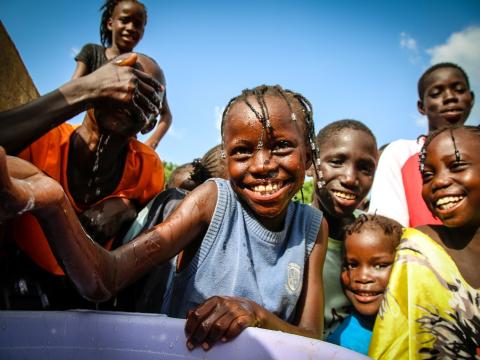Our impact in Water, Sanitation & Hygiene across Senegal in 2021

In 2021, the WASH program of World Vision Senegal (SENWASH) facilitated the implementation of sectoral interventions relating to access to water, hygiene promotion, and access to adequate sanitation. In collaboration with the programs (AP) of World Vision in Senegal, various objectives have been achieved.
Thus, children and adults have access to drinking water, have latrines, and have become aware of good hygiene and sanitation practices. By focusing on the most vulnerable households, the program improved school infrastructure and health posts.
2021 has seen SENWASH make significant achievements towards meeting the set annual targets in WASH.

Communities, municipalities, or households
Water supply
Some 53 taps were built and put into service in the communities where we serve. As a result, 18,957 people have access to drinking water thanks to the taps built by the program. The particularity for this year is that we have 467 among the 18,957 people who have gained access to SAFELY MANAGED (water in individuals’ premises) drinking water services because of World Vision assistance in the central zone. The installation of 11 water system supplies are designed and constructed for multiple uses. Thanks, to these water supply systems women groups, have agricultural activities like market gardening.
Solar pumps have been used for all the water supply systems to facilitate access to water close to the populations. This allows them particularly women, to get more time to do other income-generating activities. The monitoring of water quality at households and sources level has paid our attention. Thus, 4,734 households were made aware of the importance of drinking water treatment. These sensitizations were accompanied by the distributions of P&G water purifiers in the regions of Kédougou, Kolda, and Tambacounda, where rural populations use water from open wells and rivers, which are often polluted. 1,778 households were sensitized to safe transportation, handling, storage, and dispensing water for drinking.
Sanitation
For the sanitation component, 1,814 people gained access to sanitation facilities by constructing 204 household latrines thanks to sponsorship funding.
Before the intervention of the enterprises, community workers trained in sanitation marketing go through the household, discuss, and convince people about the importance of latrines in their health. Thus, people mobilize money to contribute to the cost of the latrine.
Hygiene
Regarding hygiene promotion in communities, 6,507 people participated in behavior change sensitizations after which, they constructed/placed handwashing facilities in 711 households.
Meetings held and sensitizations made by 118 religious leaders trained on the WASH allowed to talk about the importance of latrines at the household level and to eradicate open defecation.
The sensitization activities around hygiene promotion and sanitation done by community workers, helped households to master the decanting and water treatment with bleach. They do household visits to discuss with all the people in the household how to use sustainably the latrines and promote hygiene practices.
Multi-sectoral approaches
The savings for transformation groups (S4T) set up by World Vision facilitated the sensitization of 711 households to install handwashing devices to adopt good hygiene practices. They facilitate also the obtaining of latrines for members. Integrating with the Livelihood sector, helped move up people on the sanitation ladder. This helped us to promote the sanitation-marketing approach. The trained S4T members have acquired the skills to convince their pairs not only to adopt good hygiene practices but also to contribute financially to obtaining latrines in their households.
The health and nutrition technical program promoted the behavior change messages to improve the hygiene outcome. Twenty donkey carts were made available for the populations for waste collection. This allows having a clean environment where no disease can thrive. The local authorities are involved in the management system. This will help with sustainability.

Schools
Water supply
In 2021 at the school level, a connection to the existing water supply network was made in the target villages. 14 education facilities have access to a BASIC drinking water facility where 20 water points were built. This allows 3,727 children to have access to basic drinking water.
Sanitation & Hygiene
In 2021, 27 improved, sex-separated latrine stalls, on-premise of 13 education facilities allow 3,962 children to gain access to adequate sanitation in education facilities. All these latrines in the education facilities are with menstrual hygiene management facilities in place. The programs have provided solid waste bins to 28 schools. In terms of infrastructure, 47 schools are equipped with handwashing facilities, 18 education facilities with at least one BASIC handwashing facility that meets the needs of people with limited mobility. This allows 7,355 children have access to handwashing facilities in education facilities.

Healthcare Facilities (HCF)
Water supply
For the water supply of health structures, water storage tanks of 5,000 liters have been set up. Likewise, 08 health posts have benefited from the water supply to facilitate storage and allow them to always have water thanks to the project Mabo WASH. This contributes to reaching the number of people above (11200 to have access to drinking water. Today, the availability of water in health facilities is not a challenge especially for women during periods of childbirth.
Sanitation & Hygiene
In the health structures, 4 blocks of latrines with 2 stances each, considering the separation by sex and the status of people living with a disability are built. These latrines are built with the collaboration of the competent technical services to meet the requirements while considering the concerns of users at the level of health structures. 13 health facilities with BASIC sanitation services in which 5 functional bathing rooms with water available for women in postnatal care area were built or by World Vision.
We have provided 3 separate bins to manage healthcare waste in 4 health and 8 subsidized improved sex-separated latrine stalls on-premises in health facilities.
The well-being of children and families is impossible without sustainable and equitable access to drinking water, dignified sanitation, and appropriate hygiene behaviors. We believe that every child deserves and has the right to safe drinking water. We are determined to guarantee it!